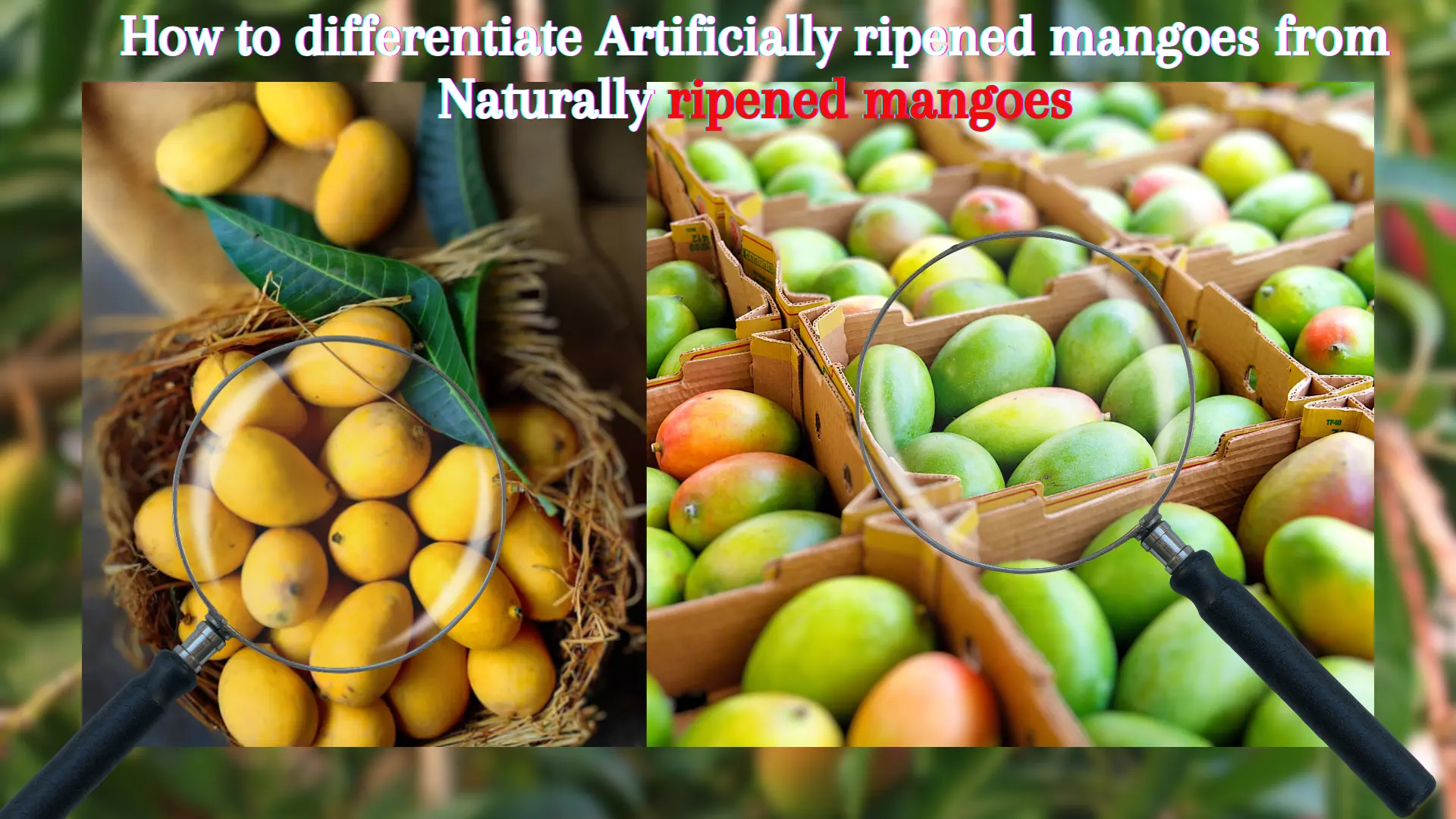Tips to differentiate Artificially ripened mangoes from Naturally ripened mangoes.
Mangoes are rich in vitamins and minerals, including vitamin C, vitamin A, and potassium. They are also a good source of dietary fiber and antioxidants. There are many different varieties of mangoes, each with its own unique flavor and texture. Some of the most popular varieties include the Alphonso mango, the Tommy Atkins mango, and the Ataulfo mango.
Read also: 5 things to treat Psoriasis with the help of Ayurveda
Mangoes can be enjoyed ripe or unripe and are commonly used in both sweet and savory dishes. They are a popular ingredient in many cuisines, including Indian, Thai, and Mexican cuisine.
Artificially ripened mangoes can be differentiated from naturally ripened mangoes by looking for some key differences:
Read also: How to get better sleep at night?
Color
- Naturally ripened mangoes usually have a uniform color with no patches or spots, while artificially ripened mangoes may have uneven colors and patches.
- The difference in color between artificially ripened mangoes and naturally ripened mangoes can vary depending on the ripening agent and the ripening process used. However, in general, artificially ripened mangoes may have a darker or uneven color compared to naturally ripened mangoes.
- Artificially ripened mangoes may also have a yellowish or greenish tint to their color, which is not typically seen in naturally ripened mangoes. This is because calcium carbide, a common ripening agent used for mangoes, can cause over-ripening and discoloration of the fruit. On the other hand, naturally ripened mangoes usually have a more uniform color throughout the fruit, with no patches or spots of different colors. They also have a bright, vibrant orange or red color, depending on the variety of mango. It’s important to note that the color of the mango should not be the only factor used to determine if it has been artificially ripened. Other factors such as texture, taste, and smell can also be used to distinguish between artificially and naturally ripened mangoes.
Read also: 6 Habits to Quit right now and 3 Habits to Stay Strong in Hard Times!
Texture
- Naturally ripened mangoes are generally softer and have a smooth texture, while artificially ripened mangoes may be harder and have a slightly rough texture.
- The texture of artificially ripened mangoes and naturally ripened mangoes can be different, depending on the ripening process used. In general, naturally ripened mangoes tend to have a softer and more delicate texture than artificially ripened mangoes.
- Naturally ripened mangoes have a naturally occurring enzyme called “pectinase” that breaks down the fruit’s pectin, which makes it softer and more tender. The fruit also naturally releases ethylene gas during the ripening process, which helps to soften it further.
- Artificially ripened mangoes, on the other hand, may have a harder and more fibrous texture due to the use of ripening agents such as calcium carbide. Calcium carbide generates acetylene gas, which mimics the natural ripening process but does not break down the pectin in the fruit in the same way. This can result in a harder texture and less tender fruit.
Read also: 10 Ways to Manage Stress?
It’s worth noting that the texture of a mango can also be influenced by other factors such as the variety of the fruit, the ripeness at which it was harvested, and the storage conditions. It’s best to buy mangoes from a trusted source and ask questions about their ripening process to ensure you’re getting naturally ripened fruit with the desired texture.
Taste
Artificially ripened mangoes may have a less intense flavor compared to naturally ripened mangoes.
- The taste of artificially ripened mangoes and naturally ripened mangoes can be different, and in general, naturally ripened mangoes tend to have a better and more intense flavor than artificially ripened mangoes.
- Artificially ripened mangoes are often picked before they are fully ripe and then exposed to ripening agents such as calcium carbide. These agents may affect the natural flavor of the fruit, resulting in a less intense flavor compared to naturally ripened mangoes.
- Naturally ripened mangoes, on the other hand, are allowed to ripen on the tree and develop their natural sweetness and flavor. The fruit also undergoes natural chemical changes during ripening, which can enhance its flavor and aroma.
The taste of a mango can also be influenced by other factors such as the variety of the fruit, the ripeness at which it was harvested, and the storage conditions. It’s best to buy mangoes from a trusted source and ask questions about their ripening process to ensure you’re getting naturally ripened fruit with the desired taste.
Smell
- Naturally ripened mangoes have a sweet aroma, while artificially ripened mangoes may have a chemical smell.
- The smell of artificially ripened mangoes and naturally ripened mangoes can be different, and in general, naturally ripened mangoes tend to have a more fragrant and sweet aroma than artificially ripened mangoes.
- Artificially ripened mangoes may have a chemical or pungent odor due to the use of ripening agents such as calcium carbide. This is because calcium carbide generates acetylene gas, which can affect the natural aroma of the fruit.
- Naturally ripened mangoes, on the other hand, develop their natural aroma as they ripen on the tree. The fruit undergoes natural chemical changes during ripening, which can enhance its fragrance and sweetness.
The smell of mango can also be influenced by other factors such as the variety of the fruit, the ripeness at which it was harvested, and the storage conditions. It’s best to buy mangoes from a trusted source and ask questions about their ripening process to ensure you’re getting naturally ripened fruit with the desired aroma.
So, it’s best to buy mangoes from a trusted source and ask questions about their ripening process to ensure you’re getting naturally ripened fruit.










